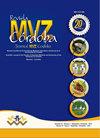Canola processing effects on the intestine, blood, and kidney of broiler breeder hens
IF 0.3
4区 农林科学
Q4 AGRICULTURE, DAIRY & ANIMAL SCIENCE
引用次数: 0
Abstract
Objective. Canola meal is one of the most important vegetable protein that contained the antinutritional factors. The aim of the study was to study the effect of canola processing on the intestine traits, blood metabolites, and kidney enzymes of broiler breeders. Material and methods. Four hundred fifty broiler breeder hens were used for 3 months. The completely randomized design was used with 6 treatments (unprocessed, processed by Lactobacillus Plantarum, Bacillus Subtilis, Aspergillus Oryzae, Neurospora Cytophilla, and Alkalase enzyme) and 5 replications. The collected data were analyzed by the LSmeans procedure of SAS statistical software. Results. The effects of treatments were significant on blood metabolites (p<0.05). Glucose concentration and High-density lipoprotein (HDL) were increased by processing methods. Also, the caecum, jejunum and duodenum weight were influenced(p<0.05). The weight of the duodenum and jejunum was increased and caecum weight was decreased. The processing of canola meal increased the length of the villi and decreased the depth of the crypt of the jejunum (p<0.05). Treatments effect was significant on the Alanine transaminase (ALT) and Alkaline phosphatase (ALP) (p<0.05). The effect of treatments was significant on the digestive amylase, lipase and protease activity (p<0.05). The canola process improved its digestibility. In other words, its protein quality, fatty acid profile and antimicrobial properties were improved. Conclusions. The different processing methods of canola improved the hen’s traits. It can be recommended to use the processed meal instead of the raw canola meal.菜籽油加工对肉种鸡肠道、血液和肾脏的影响
目标。菜籽粕是植物蛋白中最重要的抗营养因子之一。本试验旨在研究油菜加工对肉种鸡肠道性状、血液代谢产物和肾脏酶的影响。材料和方法。450只肉用种鸡试验3个月。采用完全随机设计,共6个处理(未处理、植物乳杆菌、枯草芽孢杆菌、米曲霉、嗜细胞神经孢子菌和碱酶处理),5个重复。收集的数据采用SAS统计软件的LSmeans程序进行分析。结果。治疗对血代谢产物的影响有统计学意义(p<0.05)。葡萄糖浓度和高密度脂蛋白(HDL)升高。盲肠、空肠和十二指肠重量也受影响(p<0.05)。十二指肠和空肠重量增加,盲肠重量减少。菜籽粕处理增加了空肠绒毛的长度,降低了空肠隐窝的深度(p<0.05)。处理对谷丙转氨酶(ALT)和碱性磷酸酶(ALP)有显著影响(p<0.05)。各处理对消化淀粉酶、脂肪酶和蛋白酶活性有显著影响(p<0.05)。油菜籽加工提高了其消化率。也就是说,它的蛋白质品质、脂肪酸谱和抗菌性能得到了改善。结论。不同的油菜籽加工方法可改善母鸡的性状。可以建议使用加工过的菜籽粕代替生菜籽粕。
本文章由计算机程序翻译,如有差异,请以英文原文为准。
求助全文
约1分钟内获得全文
求助全文
来源期刊

Revista Mvz Cordoba
农林科学-奶制品与动物科学
CiteScore
0.70
自引率
0.00%
发文量
41
审稿时长
6-12 weeks
期刊介绍:
The Journal MVZ Córdoba is an open access international scientific journal financed and edited by the University of Córdoba (Colombia). The journal publishes quarterly, continuously in PDF, XML, Epub, original articles, literature reviews, brief communications and clinical cases, peer-reviewed (double-blind) in Spanish and English, which are related to the agricultural and veterinary sciences. The journal is directed to natural and legal persons of veterinary medicine, animal husbandry, public health, epidemiology, aquaculture, biology, basic biomedical sciences and biotechnology and constitutes a space for academic and scientific discussion around the work of professionals in Veterinary Medicine and Zootechnics. Four-monthly publication.
"The Journal MVZ Córdoba supports the policies for registration of clinical trials of the World Health Organization (WHO) and the International Committee of Medical Journal Editors (ICMJE), since it recognizes the importance of these initiatives for international registration and dissemination. of information about clinical studies, in open access. As a result, since 2007, the journal MVZ Córdoba only publishes clinical research articles that have received an identification number in one of the Clinical Trial Registries validated by the criteria established by WHO and ICMJE, whose addresses are available in the ICMJE website. The identification number is recorded at the end of the summary. "
 求助内容:
求助内容: 应助结果提醒方式:
应助结果提醒方式:


